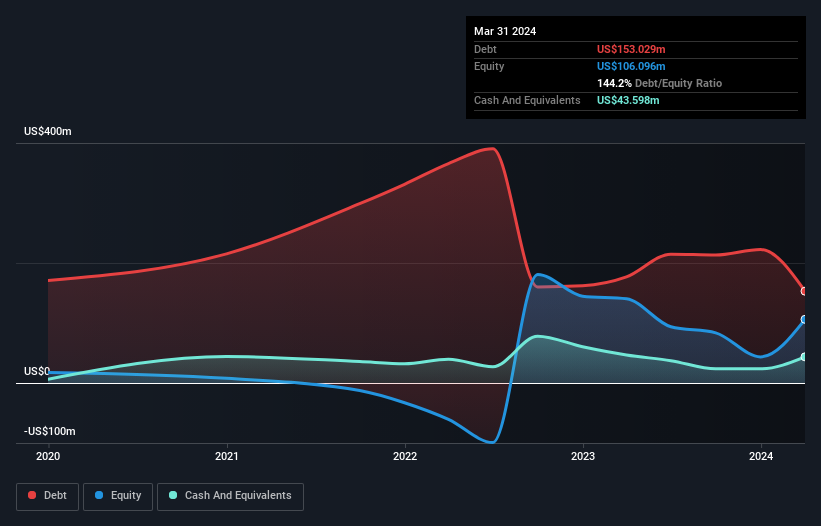- United States
- /
- Professional Services
- /
- NYSE:NOTE
Is FiscalNote Holdings (NYSE:NOTE) Using Debt Sensibly?
Warren Buffett famously said, 'Volatility is far from synonymous with risk.' It's only natural to consider a company's balance sheet when you examine how risky it is, since debt is often involved when a business collapses. We note that FiscalNote Holdings, Inc. (NYSE:NOTE) does have debt on its balance sheet. But the real question is whether this debt is making the company risky.
What Risk Does Debt Bring?
Debt and other liabilities become risky for a business when it cannot easily fulfill those obligations, either with free cash flow or by raising capital at an attractive price. Part and parcel of capitalism is the process of 'creative destruction' where failed businesses are mercilessly liquidated by their bankers. However, a more usual (but still expensive) situation is where a company must dilute shareholders at a cheap share price simply to get debt under control. Of course, the upside of debt is that it often represents cheap capital, especially when it replaces dilution in a company with the ability to reinvest at high rates of return. When we examine debt levels, we first consider both cash and debt levels, together.
Check out our latest analysis for FiscalNote Holdings
How Much Debt Does FiscalNote Holdings Carry?
You can click the graphic below for the historical numbers, but it shows that FiscalNote Holdings had US$153.0m of debt in March 2024, down from US$176.7m, one year before. However, because it has a cash reserve of US$43.6m, its net debt is less, at about US$109.4m.

How Healthy Is FiscalNote Holdings' Balance Sheet?
Zooming in on the latest balance sheet data, we can see that FiscalNote Holdings had liabilities of US$63.8m due within 12 months and liabilities of US$187.9m due beyond that. On the other hand, it had cash of US$43.6m and US$15.8m worth of receivables due within a year. So it has liabilities totalling US$192.3m more than its cash and near-term receivables, combined.
When you consider that this deficiency exceeds the company's US$186.8m market capitalization, you might well be inclined to review the balance sheet intently. Hypothetically, extremely heavy dilution would be required if the company were forced to pay down its liabilities by raising capital at the current share price. The balance sheet is clearly the area to focus on when you are analysing debt. But it is future earnings, more than anything, that will determine FiscalNote Holdings's ability to maintain a healthy balance sheet going forward. So if you're focused on the future you can check out this free report showing analyst profit forecasts.
Over 12 months, FiscalNote Holdings reported revenue of US$133m, which is a gain of 12%, although it did not report any earnings before interest and tax. We usually like to see faster growth from unprofitable companies, but each to their own.
Caveat Emptor
Over the last twelve months FiscalNote Holdings produced an earnings before interest and tax (EBIT) loss. Indeed, it lost a very considerable US$57m at the EBIT level. When we look at that alongside the significant liabilities, we're not particularly confident about the company. We'd want to see some strong near-term improvements before getting too interested in the stock. Not least because it burned through US$28m in negative free cash flow over the last year. That means it's on the risky side of things. The balance sheet is clearly the area to focus on when you are analysing debt. But ultimately, every company can contain risks that exist outside of the balance sheet. Case in point: We've spotted 3 warning signs for FiscalNote Holdings you should be aware of, and 1 of them is significant.
If, after all that, you're more interested in a fast growing company with a rock-solid balance sheet, then check out our list of net cash growth stocks without delay.
New: AI Stock Screener & Alerts
Our new AI Stock Screener scans the market every day to uncover opportunities.
• Dividend Powerhouses (3%+ Yield)
• Undervalued Small Caps with Insider Buying
• High growth Tech and AI Companies
Or build your own from over 50 metrics.
Have feedback on this article? Concerned about the content? Get in touch with us directly. Alternatively, email editorial-team (at) simplywallst.com.
This article by Simply Wall St is general in nature. We provide commentary based on historical data and analyst forecasts only using an unbiased methodology and our articles are not intended to be financial advice. It does not constitute a recommendation to buy or sell any stock, and does not take account of your objectives, or your financial situation. We aim to bring you long-term focused analysis driven by fundamental data. Note that our analysis may not factor in the latest price-sensitive company announcements or qualitative material. Simply Wall St has no position in any stocks mentioned.
About NYSE:NOTE
FiscalNote Holdings
Operates as a technology provider for global policy and market intelligence in North America, Europe, Australia, and Asia.
Adequate balance sheet with slight risk.
Market Insights
Community Narratives




